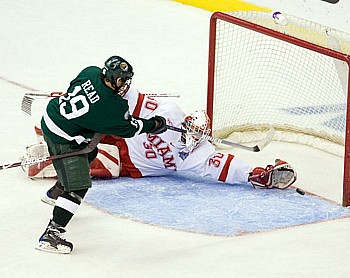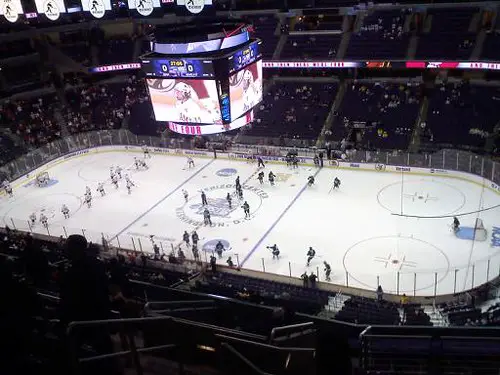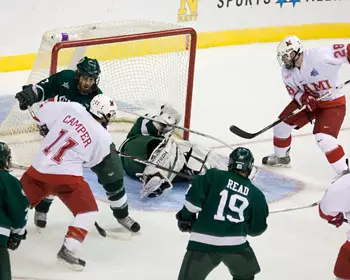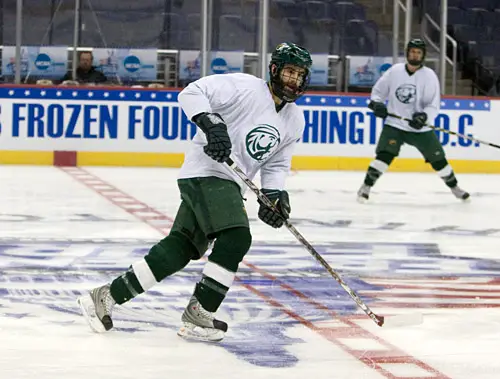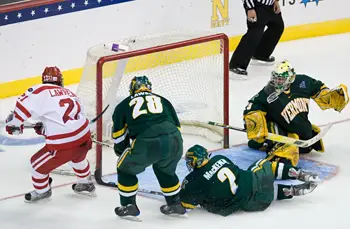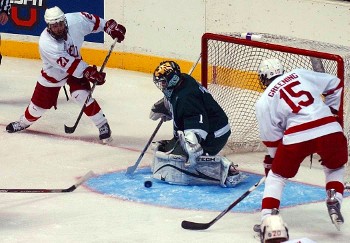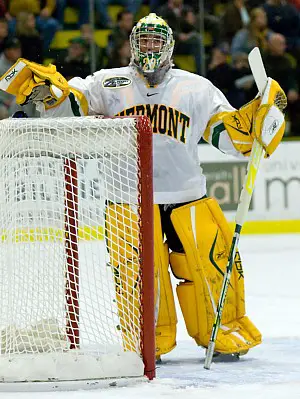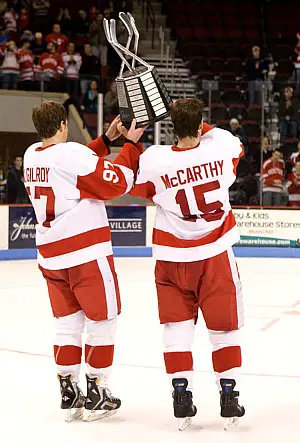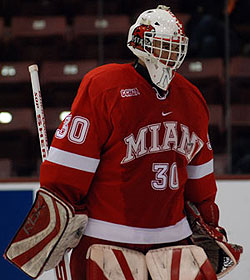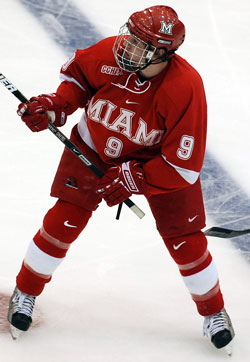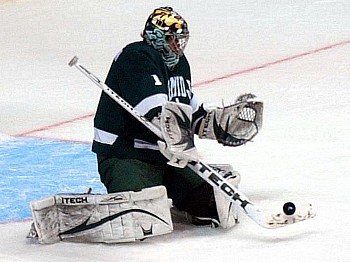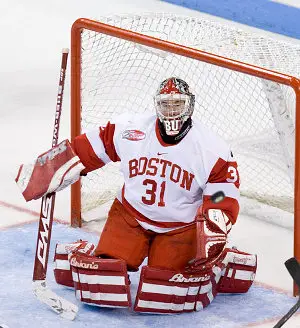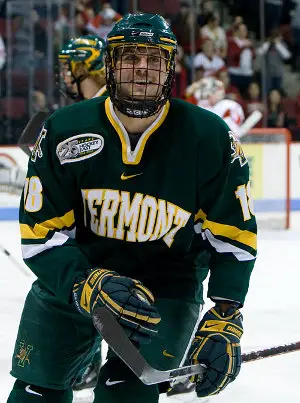Every year features wonderful hockey in the postseason. It seems that when the NCAA tournament rolls around, teams naturally ratchet up the intensity, the drama, and the excitement. Whether it is a multiple-overtime game or a goal the likes of which no one has ever seen, incredible efforts seem to arrive at the end of March and early April.
But this season just might be the best NCAA hockey tournament ever.
There have been so many fantastic games, heart-stopping moments and stunning events in the four hockey regionals that you would be forgiven for having missed some of the action, if your team or a team from your league wasn’t involved.
So I’ve classified the top ten stories of the NCAA tournament so far, as I see them.
1) Upsets, Upsets, Upsets
This one is obvious. Of the 12 games played so far, eight have been won by the lower seed. Three of the four No. 1 seeds were eliminated in the first round, as were three of the four No. 2 seeds.
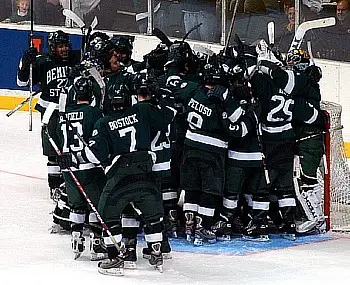
Bemidji State battled its way into the Frozen Four with a pair of decisive upset wins (photo: Christopher Brian Dudek).
I was most startled by this underdog uprising after the second game of the tourney was played, and No. 3 overall seed Denver lost to Miami, immediately after overall No. 4 Michigan lost to Air Force. Just like that, there had been two No. 1 seeds eliminated.
Honestly, as the number of upsets mounted throughout the weekend, they lost a little bit of novelty to me. But there’s no doubt the upside-down nature of the brackets was an undercurrent to every other story, heightening the tension and making them seem even more dramatic than they otherwise would have been.
2) Pearce’s Flub
Notre Dame goalie Jordan Pearce was considered by many to be the best player not on the list of top ten Hobey Baker candidates. Some, like my fellow USCHO.com writer Dave Starman, went so far as to say that Pearce was robbed, and should have made the cut to ten.
This is not at all unreasonable, as Pearce went into the NCAA tournament with a jaw-dropping 1.61 goals against average and .934 save percentage.
However, Notre Dame allowed a goal to Bemidji State just 1:42 into the game as Pearce made a mistake that ended up lighting the lamp. Here’s the description from USCHO’s Bob Miller’s game recap:
Less than two minutes into the contest, Notre Dame netminder Jordan Pearce misplayed the puck behind his net, fanning on a clearing pass. The puck bounded off the side of the Notre Dame net, and Bemidji State’s Chris McKelvie grabbed the loose puck and tucked it by a surprised Pearce at 1:48.
Just like that, his confidence was shaken, and he ended up allowing four goals on just 18 shots.
3) Nylander’s OT Save
This may have been the single best play in all the regionals. In the East Regional final, Vermont and Air Force were locked at 2 in overtime, and toward the end of the frame, Vermont’s leading scorer Viktor Stalberg got a shot on net.
The puck got past AFA goalie Andrew Volkening, but center Brett Nylander knocked the puck out of midair and kept it from crossing the goal line. The play was so close, it had to be reviewed before the non-goal was confirmed.
The only thing keeping this play from being higher on the list was that Vermont went on to win anyway, later in double OT.
4) Gwoz/Blasi Matchup
Most of the time, the stories come from the teams: they are traditional rivals, or one team knocked the other out of the tournament last year, etc. Rarely are the coaches central to the narrative.
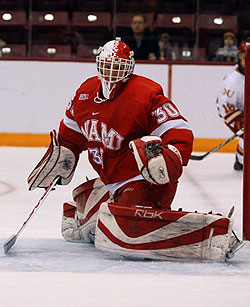
Cody Reichard and Miami overcame Denver and then Minnesota Duluth to reach the school’s first Frozen Four (photo: Tim Brule).
The Denver vs Miami game was one of those rare times.
Miami head coach Enrico Blasi played for the RedHawks under then-coach George Gwozdecky, and later was an assistant in Denver after Gwozdecky moved there. The two coaches remain good friends to this day, and the meeting between them had quite the emotional impact.
From that game’s notebook, by Scott Brown and Todd Milewski:
First, Gwozdecky took his turn in emotionally describing his relationship with his former player and assistant coach. Then Blasi did the same about his mentor.
At one point, Gwozdecky choked up, saying after a pause that it’s the end of the year and that he doesn’t like losing.
“It’s a little bit like coaching against your son,” Gwozdecky said. “I hate losing to a family member, but if you’re going to lose, it hurts less because we’re losing to a classy program and a classy coach like Enrico Blasi.”
5) Princeton/Northeastern repeating (but not in a good way)
Two different teams replayed nightmare scenarios in their respective NCAA games, just a week after experiencing the same thing in the conference playoffs.
In the ECACHL semifinals, Princeton held a two-goal lead over Cornell with just three minutes to go, but allowed two goals to tie the game and then gave up the overtime winner.
Similarly, the Tigers had a two-goal lead over Minnesota Duluth in the West Regional in Minneapolis with just a minute to go, but allowed two strikes to tie, and then fell in overtime.
Northeastern had a 2-0 lead over Mass.-Lowell at the midpoint of the Hockey East semifinal and allowed two goals, including an extra-attacker goal in the final minute of regulation, before falling 3-2 in overtime.
And then again in the Midwest Regional, Northeastern faced the same offensively-challenged Cornell team that had stunned Princeton in the ECACHL tournament. The Huskies had a 2-0 lead at the halfway mark and coughed it up, including a goal in the final minute of regulation to lose, 3-2.
From NU goalie Brad Thiessen’s blog, In the Crease With Thiess comes his reaction:
It has taken a few days and still I can’t quite get the thoughts out of my head or the feeling in my stomach of what happened on Saturday night. I think I can speak for most of the guys when I say we are kind of still in shock and don’t really know what to do with ourselves right now. To lose the game like we did, for the second game in a row was pretty devastating. I mean when you do it once and you still have something to play for it eases the pain a bit, but when it ends your season it’s a little more difficult to swallow.
6) Phantom Goal in UVM-AFA
In a weekend filled with unlikely comebacks, upsets all over the place, overtime heroics and highlight-reel goals, a most unusual game-winner determined the first of the Frozen Four teams.
It happened in a game I already mentioned above, the overtime match between Vermont and Air Force. In the second overtime, a pileup occurred in front of the Air Force goalie Andrew Volkening, and after the whistle blew, the referees called for a video replay. It wasn’t clear what they were reviewing, because the puck never got anywhere near the goal line.
It turned out the play being reviewed wasn’t the most recent save by Volkening, but a shot that had happened several minutes before. The puck hadn’t been stopped, so play hadn’t been whistled dead, and no review had been possible until there was a stoppage.
The play in question was by Vermont defenseman Dan Lawson, who took a high shot on Volkening that looked to have gone over the crossbar and hit the boards behind the net as play continued.
But upon further review — 12 minutes’ worth — it was determined that Lawson’s shot had actually gone into the net, through a hole in the rear of the cage and back into play. It was a goal, and Vermont had earned a berth in D.C.
In a sudden-death game emotions run high, and when a goal is scored all the tension is released as the victorious players rush onto the ice in a big pile-up and the losing team collapses in frustration. But that never happened here.
Instead, a routine play caused a stoppage, followed by 12 minutes of video review, followed by Vermont suddenly being awarded a victory. How anti-climactic! What a fittingly bizarre play to cap the regional action.
The best part is to play “What If” with this game: what if no one had caught the play and Vermont hadn’t won this way? Would the Catamounts still be on the way to Washington? What if Air Force had scored a goal to win, the Falcons celebrated the victory, and only then was the tape reviewed to determine that no, Vermont had won after all?
7) Two last-minute game-winners
Two different games featured ties right up to the end … well, almost to the end.
Northeastern was locked in a 2-2 battle with the Big Red in Grand Rapids, and Cornell’s Evan Barlow scored with just 18 seconds left in the game to sink NU’s season.
And in the Northeast Regional final, New Hampshire and Boston University were tied at 1 for the majority of the game before Terrier Jason Lawrence banked a shot off a Wildcat defenseman for the winner with just 15 seconds left.
Way to avoid overtime, guys!
8) Two last-second game-tying goals
Even more remarkable, though, than the goals that prevented overtime were the goals that forced it.
In the Princeton vs. Minnesota Duluth game mentioned earlier, the Bulldogs were facing a two-goal deficit with just a minute remaining. Time to panic?
Not really. On the power play, UMD pulled the goalie to create a six-on-four advantage and scored with 40 seconds left to pull within one. They pulled the goalie again, created pressure again, and it finally paid off, with 0.8 seconds left.
That’s not a typo. Not eight seconds left, but eight-tenths of a second left.
With all the momentum from the two goals, it’s not too surprising that Duluth converted in OT, at 13:39.
But the next day, New Hampshire bested that comeback.
Trailing 5-4 to North Dakota in the waning moments of the game, New Hampshire pulled goaltender Brian Foster for the extra attacker. Both teams called their timeouts: first New Hampshire to set up the offense, then UND to prepare a counter.
Three faceoffs in a row were won by the Fighting Sioux, including one in the North Dakota zone with less than ten seconds on the clock. A Sioux player fired the puck out of play, and replay had to be used to determine if the resulting faceoff would be in front of UND goalie Brad Eidsness or out of the zone, which would have all but doomed any chance the Wildcats may have had.
Replay confirmed the faceoff would be in the zone with about four seconds left, meaning New Hampshire had a chance, however small. New Hampshire assistant coach Scott Borek elected to have right-hander Thomas Fortney take the faceoff to maximize his chance of a shot if he won the faceoff. He did and got the puck to Mike Sislo, who passed it to Jerry Pollastrone, who dished across the crease to Fortney, who was parked at the corner of the net for the tap-in.
Time left on the clock? 0.1 seconds. One-tenth of one second.
UNH went on to win just 45 seconds into overtime on a goal by Peter LeBlanc.
Everything had to go right for the Wildcats in the final few seconds: the faceoff had to be in the North Dakota zone; New Hampshire had to win the faceoff; the puck had to get in the net. It all went off exactly as it needed to, and even then the Wildcats were almost too late.
So we had two teams that led their NCAA playoff games with less than a second left on the clock, and both teams ended up losing. Unreal.
It would be thrilling to get one of these games in a season. But two? On back-to-back nights? In the NCAA playoffs? Are you kidding me?
9) Bemidji State in the Frozen Four
Okay, let me confess. I went to high school in northern Minnesota, about a 45-minute drive from Bemidji. We had events happening at Bemidji State all the time: speech meets, band competitions, play performances, and so on. Sometimes it seemed like I was on campus every other weekend. I applied to and was accepted by BSU, although I didn’t ultimately end up attending.
So personally, I’m thrilled that Bemidji State is going to be in the Frozen Four. I’ve heard so many people lately ask, “Where in the world is Bemidji?” and I imagine the statue of Paul Bunyan on Lake Bemidji not far from campus, smiling.
But there is also a great hockey story here.
BSU has a proud hockey tradition at the Division II level. The Beavers won five national championships in Division II from 1984 through 1997, but once the NCAA decided to discontinue the Division II championship, some of the schools at that level, including Bemidji State and Alabama-Huntsville, made the jump to Division I. The Beavers have been playing a Division I schedule since 1999.
Bemidji is in the tournament representing College Hockey America, having won the league’s autobid. The Beavers would not have been selected with an at-large bid, and wasn’t even in the PairWise Ranking, which lists the top 25 teams in the country.
With the CHA itself falling apart and the future of the league’s autobid in question, Bemidji State has applied for membership to the WCHA, which makes the most sense geographically. In fact, the women’s hockey program at Bemidji State already plays in the WCHA, but an expansion ban in the men’s league has prevented adding the BSU men in the past. Now Bemidji faces the all-too-real prospect of having no league to play in. The school will have to consider dropping hockey if not accepted into the WCHA.
With all that in mind, the Beavers made it to the NCAAs, managed to upset heavily favored Notre Dame 5-1 for their first NCAA postseason victory, and then followed that up with a 4-1 win over Cornell. BSU thereby became the first team not from the “Big Four” conferences — the CCHA, ECACHL, Hockey East, or the WCHA — to make the Frozen Four.
Not only is the overall No. 16 seed advancing to the Frozen Four, but the only team in the tournament not ranked in the USCHO.com/CBS College Sports Division I Men’s Poll is the only team of the four remaining that convincingly beat its first two opponents.
No WCHA team will be in Washington, D.C., unless the league gets smart in the next few days and accepts Bemidji’s application.
10) BU in the Frozen Four
It’s nice to have Boston University back in the Frozen Four after over a decade of absence. The Terriers were in the Frozen Four in 1990, 1991, 1993, 1994, 1995, 1996, and 1997, winning it all in 1995. But after that was an 11-year gap that stymied the faithful BU fans, who were accustomed to competing for the national title year in and year out.
But how can it be among the top storylines of the tournament that the overall No. 1 seed is in the Frozen Four?
Well, it’s not what happened, it’s how it happened.
After an 8-3 romp over Ohio State in the Northeast Regional semifinal, the Terriers found themselves in battle with New Hampshire in the final on Sunday.
Quite simply, the Wildcats outshot, outhustled, outskated, outattempted, and out-everythinged the Terriers throughout the game. BU managed to score a goal midway through the first period, and after that was forced to weather New Hampshire’s barrage.
UNH drew even with a goal in the second period, and it was only because of heroics of Hockey East Rookie of the Year goalie Kieran Millan that the Terriers were not looking at a multi-goal deficit. The third period was slightly better for BU, but New Hampshire still had a territorial advantage and was playing well.
Until the final minute of the game. Jason Lawrence managed to throw a puck in the vicinity of the net, but it was headed wide to the right. Then it bounced off the leg of a UNH defenseman and then off the arm of a diving Wildcat player and redirected past Foster into the net with just 15 seconds remaining. And just like that, BU was headed to our nation’s capital.
Remember what I said about not what, but how? Forget it, I was wrong. It’s the what as well.
Simply said, one of the No. 1 seeds had to advance to the Frozen Four to maintain any drama of the potential upset. If New Hampshire had won, all four teams in the finals would have been No. 9 overall seeds or lower. No underdog story would have been possible.
You can’t have a David-and-Goliath story without Goliath.
Considering that BU is the overall No. 1 seed, the resurgence of the Terriers as a traditional national power means they play the perfect Goliath to Bemidji’s (or Miami’s, or Vermont’s) David. After all, prior to this season, BU had 35 NCAA postseason wins and four national titles; the rest of the field combined had three postseason wins and zero championships.
So not only was BU’s win over UNH a terrific story in itself (except for the UNH fans out there), it also set up a storyline for the Frozen Four.
All that is left are three more games. I can hardly wait to learn exactly how those will surprise me.
